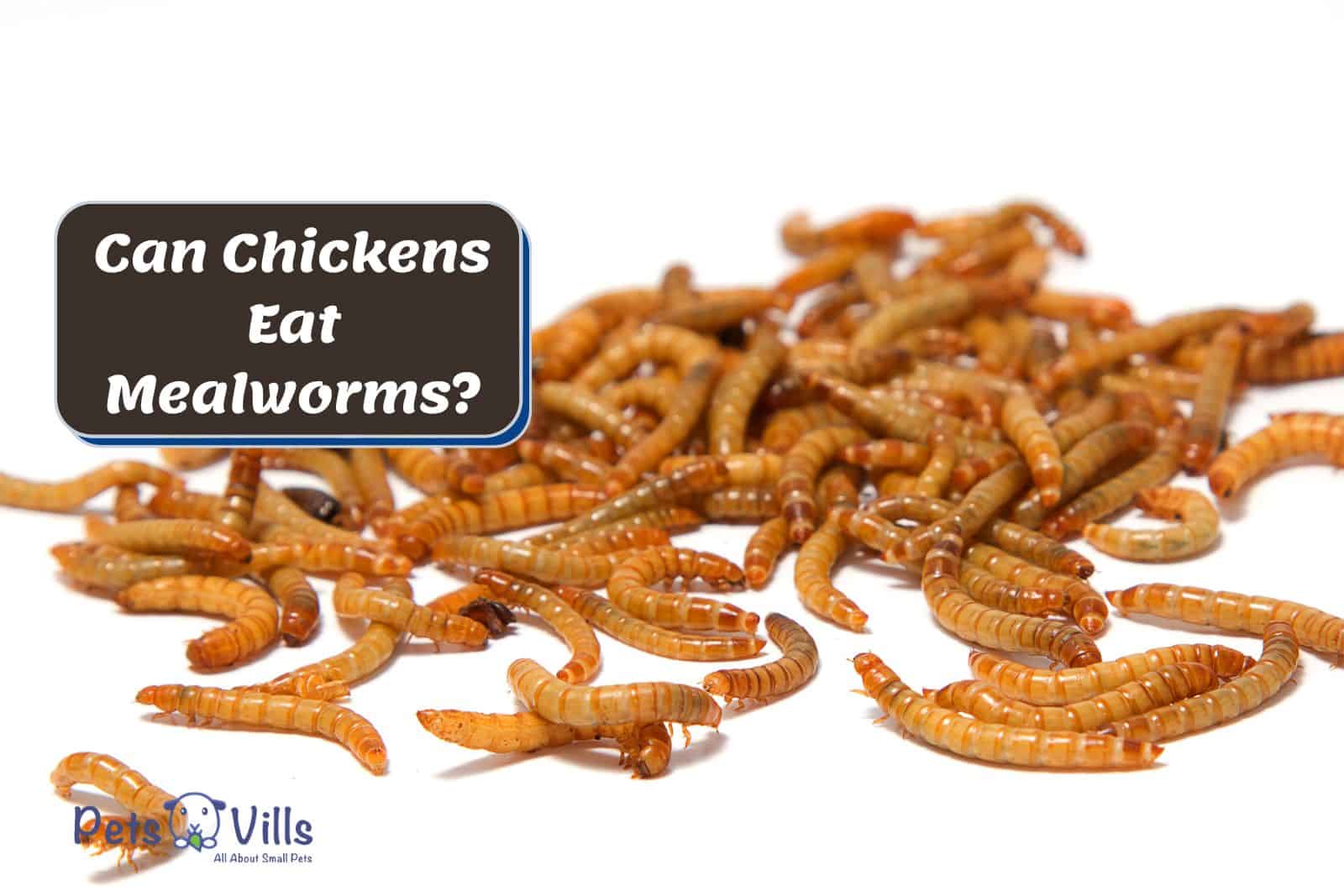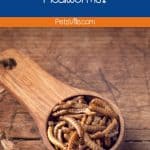What if I told you the answer to can chickens eat mealworms? Here it is:
Yes, chickens can eat mealworms, both live and dried ones.
They shower your chickens with valuable protein, fats, and other nutrients.
Best of all, mealworms are one of the chicken’s favorite food, but that’s not all: keep scrolling…
Table of Contents
Key Takeaways:
- Mealworms ― alive or dried ― pack a valuable meal for your chickens.
- These worms are nutritious, an excellent source of protein and vitamins, and a great balanced diet.
- You can feed mealworms to babies under 2 weeks and no earlier as they might choke (so be careful!)
Health Benefits of Mealworms for Chickens
According to Nutrition expert Maya Cassandra, mealworms are “nutritious and less resource-intensive than traditional livestock” [1].
Mealworms are known for their high content of nutrition, especially proteins. Other nutrients include minerals, vitamins, amino acids, and fatty acids [2].
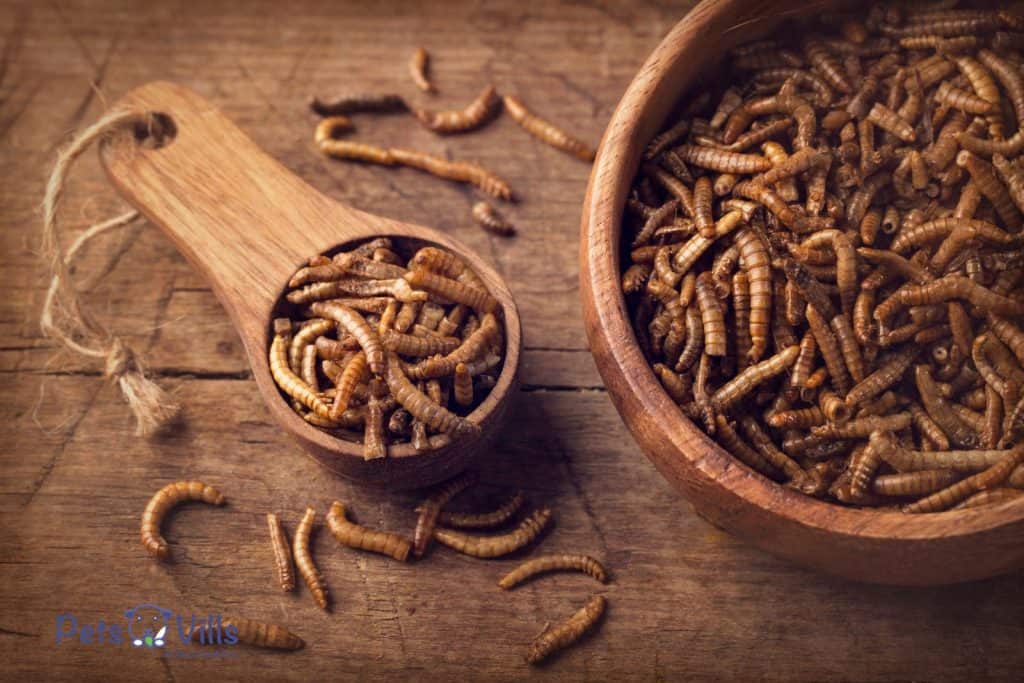
Below are some of the health benefits chickens get from eating mealworms:
1. Increase Their Protein
Animals need protein. Guess what? Chickens are no exception to this.
Thanks to mealworms, a stellar protein for chickens, your chickens can have the best of both worlds ― nutrients and a delicious meal.
Protein is needed to build and repair muscle tissues, strengthen the bones, and lower blood pressure.
For egg-laying chickens, protein is vital for the development of the eggs. It will make the eggs bigger and the shell stronger.
Regarding protein content, dried and live mealworms differ in how much they have.
Dried mealworms have around 50% protein, while live mealworms have about 30% protein.
Both types are healthy for chickens, whether dried or live mealworms. But, because of the high protein content in worms, feed them in moderation.
2. Use as Medicine
Pain and infection are 2 buzzwords we know too well. Guess what? Chickens are also susceptible; they fight and are sometimes immune to predator attacks.
Either way, your chickens will need extra protein to help repair the damaged muscle tissues.
Because of the high protein content in mealworms and their essential nutrients, feeding your chickens some will help them heal quickly from such wounds.
Just make sure not to give them too many. Stick with a teaspoon and only once a day.
3. Chicken Molting
In cold weather, chickens lose their feathers, a phenomenon known as molting.
Old feathers become dull over time and won’t be able to help insulate the bird. So, chickens will shed the old feathers and grow new feathers for the winter.
Feed your chickens these nutrient-rich mealworms to combat molting’s decrease in essential nutrients and protein.
This safeguard will help prevent their protein level from dropping too low.
For a visual summary, I’ve included a superb little video for you to review on mealworms:
Can Chickens Eat Dried Mealworms?
Thankfully, you already know the answer to can chickens eat mealworms?
Chickens can eat dried mealworms, but these worms do not provide your chickens with the healthiest feed.
Dried mealworms are mostly protein and fat content, which could lead to health problems in your chickens.
Moderation is the key to keeping the chickens healthy with dried mealworms.
When feeding them dried mealworms, always feed them quality mealworms. There are a lot of places that sell low-quality mealworms.
These are not healthy for chickens or any other pets.
The mealworms could be dead and then dried or have not gone throw the correct process of being dried, which can lead to issues for your chickens.
During molting, dried mealworms make an excellent supplementary addition to their diet. The extra protein and fat will help them build their nutrient reserves.
Are you curious about the nutritional benefits of superworms for your chickens or wondering if maggots are a suitable addition to their diet? Check out our article on ‘are superworms good for chickens‘ and ‘can chickens eat maggots‘ to learn more about these protein-packed treats for your feathered friends!
Can Baby Chicks Eat Mealworms?
Baby chickens can eat mealworms when they are at least two weeks old. Feeding them mealworms at a younger age could cause them to choke, so don’t!
Even though mealworms are nutrient-rich, your baby chickens can suffer when eating them, especially because of the worm’s rigid skeleton.
Aside from all the warnings, let me mention some terrific benefits:
- Digestive supplement: A must-have supplement for young, growing poultry and bantam breeds.
- Proper digestion: Manna Pro Chick Grit with Probiotics supports adequate digestion.
- Natural supplement: Crafted with no artificial ingredients or preservatives.
- Small sized: Insoluble crushed granite to a small size suitable for growing poultry and bantam breeds.
- Two weeks and older: Provide Manna Pro Chick Grit with Probiotics in a separate feeder to chicks 2 weeks and older.
Instead of mealworms, give your chicks grit. After feeding them this option for about 2 weeks, you can switch to mealworms. [3]
Feeding them chick grit first will give the baby chickens time to build up the grit in their gizzard.
By feeding them mealworms, later on, you will promote better digestion.
How To Feed Mealworms To Chickens
You have a few options when it comes to feeding mealworms to chickens. There’s no wrong way to feed them.
Below are some of the methods you can try:
1. The first method uses mealworms to help turn the coop bedding over. Instead of turning the bedding yourself, you can use the chickens to do it for you.
Toss some into their bedding, and the chickens will rummage through it.
2. The other method is to toss some on the ground, and the chickens will start eating it. Before putting the mealworms on the ground, ensure the area is clean first. First, remove bird dropping, leftover foods, and other debris.
If not, harmful bacteria and pests may attach themselves to the mealworms, eventually working their way into your chickens.
3. The last method is to mix the mealworms with their layer feeds. This way, they will eat the mealworms and their feeds simultaneously.
Feel free to do all the above methods with dried or live mealworms.
How Many Mealworms To Feed Chickens
Mealworms are high in fat content, which makes them unhealthy for chickens to eat a lot of [2].
So, if you’re feeding them dried mealworms, it should be no more than 4 on any day. If it’s live mealworms, it should be no more than 10 each day.
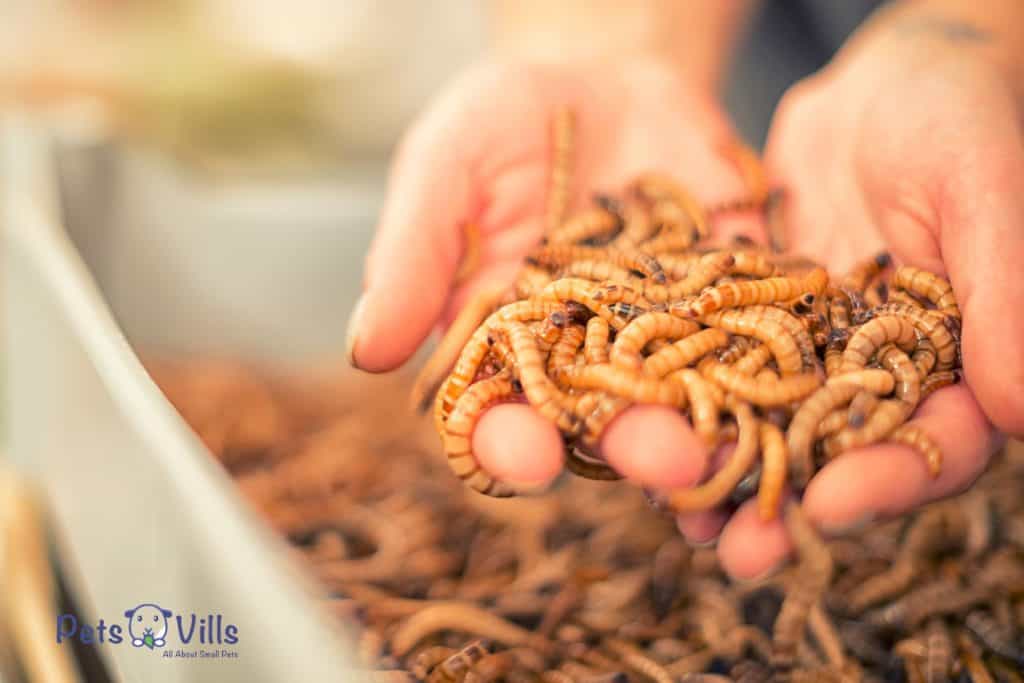
Your chickens digest mealworms easily, so feed them the worms in the morning. Feeding them at night will leave them hungry (not recommended!).
As for the quantity, feed mealworms three times per week to your chickens unless you have bantams: feed them only once or twice a week.
Overfeeding mealworms to the chickens will cause them a lot of health problems. Some causes are fatty liver disease, kidney-related issues, and obesity.
FAQs
1. Should I rather feed my chickens live or dried mealworms?
Either is OK, as long as you control their intake!
Dried mealworms have less protein than their live counterparts. Both types are nutritious and provide admirable water and protein intake.
2. Can chickens eat mealworms daily?
No, it’s best not to.
Stick with twice a week.
Mealworms have high amounts of protein and can damage your chickens’ kidneys, leading to kidney disease and gout.
3. Should dried mealworms be soaked?
No, you don’t have to soak them.
But, soaking these slippery mealworms have a benefit by hydrating the worms and increasing their water content.
4. What do I do if my chickens aren’t interested in dried mealworms?
Sprinkle these worms in the chicken feeds.
On first inspection, these worms may seem uninteresting to your chickens, but once they get used to the taste, they’ll love them.
Conclusion
So, if you’re still skeptical about can chickens eat mealworms, feed them some!
Giving your chickens this great protein diet called mealworms is brilliant:
While mealworms provide proteins and other nutrition that benefits the chicken’s health, they should be only given to them occasionally.
Mealworms are an excellent treat for chickens. They can come in mealworm snacks or commercial feeds (your choice!).
What’s more, they are among the tastiest protein foods and will supply your chickens with a delicious treat, one on the shoulders of taste and treasure.
But watch out: since these slippery beauties are high in fat, stick with three times max. If you have bantams, once or twice will do.
But if you don’t feed your chickens too many worms, they’ll be all right.
So, please share your comments with me for a proper wormalicious chicken meal!
Until next time…
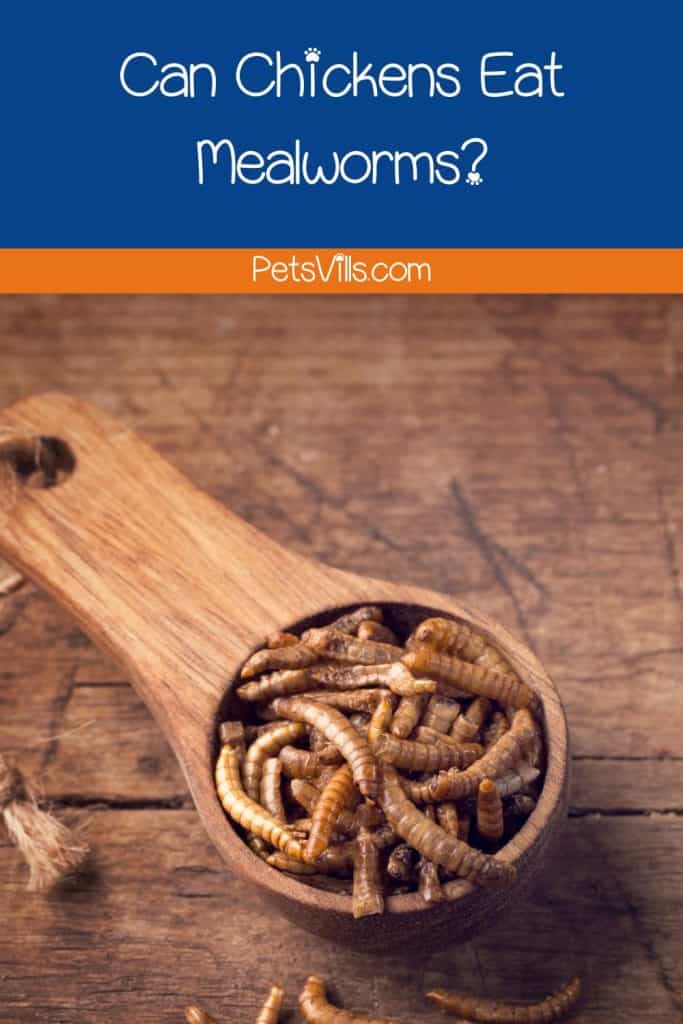
Resources
1. Jack BJ. Scientists develop “tasty” meat-like seasoning from mealworms [Internet]. www.medicalnewstoday.com. 2022 [cited 2022 Dec 24]. Available from: https://www.medicalnewstoday.com/articles/scientists-develop-tasty-healthful-meat-like-seasoning-from-mealworms#Feeding-the-future-with-sustainable-food-sources
2. Zhao X, Vázquez-Gutiérrez JL, Johansson DP, Landberg R, Langton M. Yellow Mealworm Protein for Food Purposes – Extraction and Functional Properties. Nychas G-J, editor. PLOS ONE. 2016;11:e0147791.
3. Why is Poultry Grit so important? [Internet]. www.chickenvet.co.uk. [cited 2022 Dec 17]. Available from: https://www.chickenvet.co.uk/news/post/are-you-using-poultry-grit
Alina Hartley is a small-town girl with a ginormous love of bearded dragons. It all started with Winchester, a baby bearded who was abandoned at the shelter by his former owners because of a birth defect that caused one front leg to be shorter than the other. Alina originally went to the shelter looking for a guinea pig, but one look at Winchester and it was love at first sight. From that day on, Alina has dedicated her life to learning everything she can about bearded dragons. She loves helping new beardie parents start their incredible journey with these magnificent reptiles.
Follow her on:
LINKEDIN
TWITTER.
Read her latest articles HERE
Learn more about her HERE.

